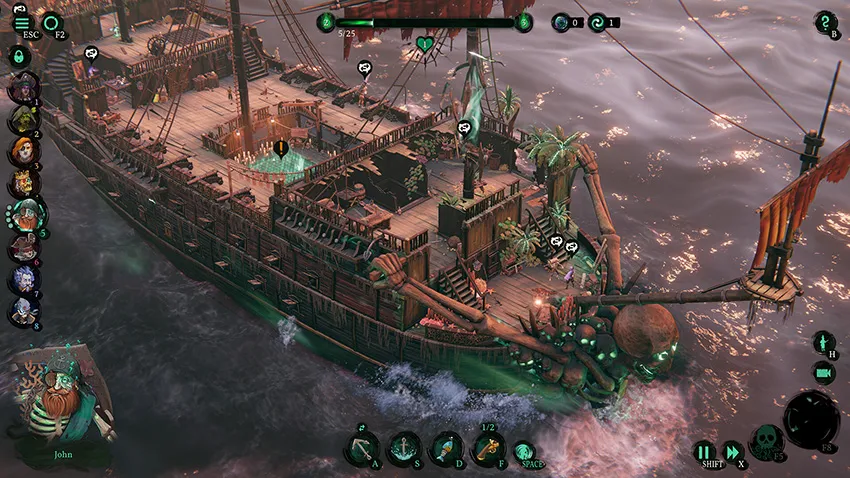With few exceptions, Mimimi Games has made stealth strategy games since its founding in 2011, but it seems that Shadow Gambit: The Cursed Crew will be its last. While the title was overshadowed by the release of giants like Baldur's Gate 3 and Starfield, it should be regarded like a ghostly knife in the dark: sharp, beautiful, and just as potent in its own way as the hulks that obscured its launch in mid-August.
Mimimi's past projects in this genre have been more reserved. The first, Shadow Tactics: Blades of the Shogun (2016), is set in a beautiful re-creation of Edo-period Japan. Desperados III (2020) plays to the other side of the Rashomon coin, with an Old West setting (and a witch thrown in for fun).
Shadow Gambit is the studio's first self-published game, and while it uses the same chassis as the others – that is, a cast of sneaky characters with their own unique approaches to stealth – it completes the holy trinity of cowboys and ninjas with pirates. Undead pirates, to be precise.
The story follows the ghost ship Marley and her colorful crew as they clobber, stab, and swindle their way through the Lost Carribean to a legendary pirate captain's treasure hoard. All that stands in their way is a long voyage and an army of anti-ghost-pirate zealots, who happen to be armed with silver bullets and a purifying flame that can destroy undead.

It's hardly an astonishing premise. "Church bad, pirates good" is arguably just a few paces away from "monarchy bad, pirates good," as seen in the Pirates of the Caribbean franchise. Like the Disney IP, Shadow Gambit is about as concerned with historicity and nuance as the former's source material, a theme park ride. And that's how the game is best approached.
That's partly because it is easier than previous Mimimi projects, at least according to some longtime fans. Mimimi's formula is unusual for strategy games, however, and one that's more forgiving by default does act as a good entry point for beginners.
Shadow Gambit differs from most stealth strategy games in a few key ways. Most notably, it's played more or less in real time, with up to three characters being controlled by one player. Many stealth games with multiple active characters are either multiplayer, assigning one character to each, or turn-based, meaning the action is paused while a single player decides each character's next move.
If keeping track of multiple characters in real time sounds overwhelming, don't worry: Shadow Gambit starts you out with just one, and introduces each new crew member with an optional tutorial on how their abilities function. And a signature Mimimi feature, called "shadow mode," makes a return to help coordinate the crew's stealth efforts.
Shadow mode lets the player plan each crew member's actions in advance, and then have them all act simultaneously. This is crucial, because stealthy takedowns can last up to five seconds, and if a crew member is spotted or a body is found, enemies can raise the alarm and swarm the pirates' last known position. And the crew won't last long in the open while outnumbered.
Enemies generally behave predictably until alerted, however, and there are ample hiding places for crew members to lurk while the player decides how to approach a situation. Often, several enemies will be in fixed positions observing each other, which means the best way to deal with them is all at once, before they can make a fuss.
Shadow Gambit also encourages "quicksaving" often, to the degree that it's described as a magical, temporal power of the ghost ship Marley rather than a nondiegetic game feature. This makes each island you visit more of a puzzle box to be probed and gradually taken apart than a high-tension slither through enemy territory. And if the player fumbles and a crewmate gets caught, they can return to a previous game state and try again in a heartbeat.
Once a player gets used to the controls, which are highly configurable anyway, they can approach each mission with as much finesse or brute force and chaos as they wish, so long as the job gets done. Completionists might enjoy the challenge of finishing missions in multiple ways, such as without any alarms being raised, or with nonlethal takedowns only.
Beyond their unique abilities, the cast is mostly differentiated by their accents and their visual designs. Anyone expecting deep motivations and profound storytelling should look elsewhere, and some players might find the exaggerated dialects somewhat grating.
But at the very least, Shadow Gambit: The Cursed Crew promises a fun romp through a colorful setting, and a series of puzzles with an impressive number of moving parts.


